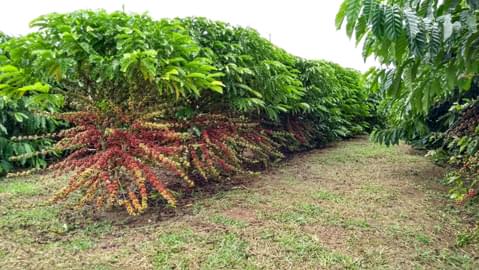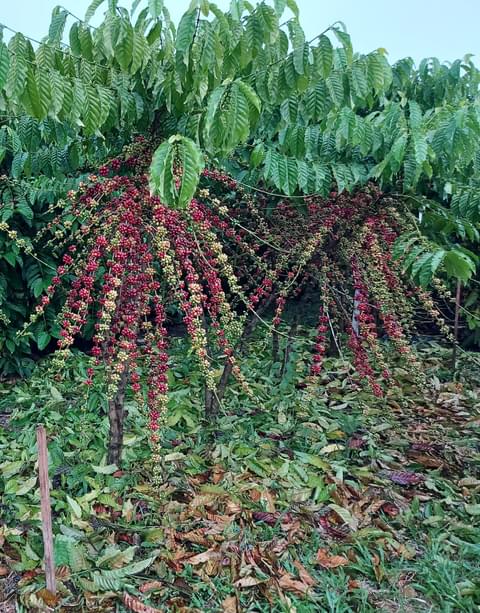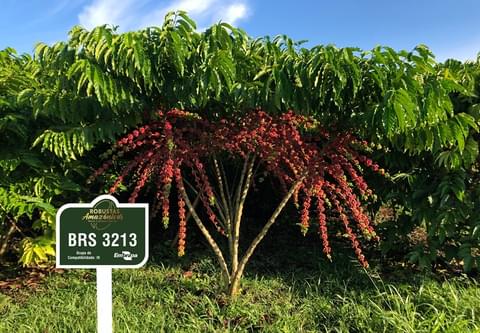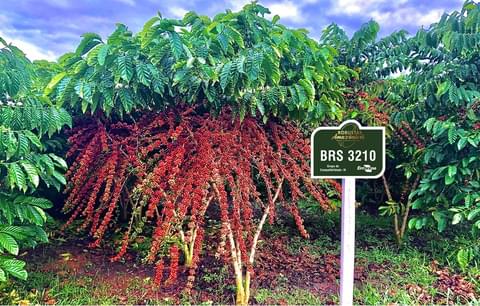
BRS 2357
Compact canopy, which allows for densification. Short stems allow one additional harvest before renewal.
Yield Potential
What is the yield potential of this variety in kg/ha of green beans? Note that yield can vary significantly depending on environmental conditions and how the variety is managed. Yield values presented here are the result of specific limited field trials undertaken by the breeders of this variety; they do not represent guarantees of yield.
Country of release
In which countries is the variety commercially available?
Mexico, Uganda, Indonesia, India, Vietnam, Brazil, Thailand, Philippines, Nicaragua
Contents of mucilage in the cherry
What is the relative amount of mucilage in the cherry? (Mucilage is the inner layer of coffee pulp that remains attached to the parchment after pulping.)
Low , Average, High, Unknown, Not applicable
Bean Size
How big are the coffee beans?
Below Average, Average, Large, Very Large, Unknown, Not applicable
Coffee leaf rust
Is the plant susceptible to leaf rust?
Coffee rust is a foliar disease of coffee caused by the fungus Hemileia vastatrix that causes defoliation and may result in severe crop losses. Plant diseases are constantly evolving. Note: A variety that is resistant to a disease today may not be resistant tomorrow.
Highly resistant, Intermediate resistance, Low resistance/Susceptible, Unknown, Not applicable
Coffee Berry Disease
Is the plant susceptible to CBD?
CBD is a coffee disease that affects the fruit. It is caused by the fungus, Colletotrichum kahawe. Currently, CBD is not present in Central America, but it is a concern that the disease will spread. Note: Plant diseases are constantly evolving. A variety that is resistant to a disease today may not be resistant tomorrow.
Resistant, Tolerant, Susceptible, Unknown, Not applicable
Nematode
Is the plant susceptible to nematodes (specifically the species Meloidogyne spp. and/or Pratylenchus spp.)? Nematodes are microscopic animals which infect the plant roots and can cause wilting and death of the plant.
Resistant, Tolerant, Susceptible, Unknown, Not applicable
Coffee Berry Borer
Is the plant susceptible to coffee berry borer? Coffee berry borer (Hypothenemus hampei), called broca in Spanish, is a bark beetle endemic to Central Africa that is now distributed throughout all coffee-producing countries in the world, with the exception of Nepal and Papua New Guinea.
Resistant, Tolerant, Susceptible, Unknown, Not applicable
Shoot hole borer (_Xylosandus compactus_)
Is the plant susceptible to shoot hole borers (Xylosandus compactus)? Shoot hole borer is a species of ambrosia beetle. Common names for this beetle include black twig borer, black coffee borer, black coffee twig borer, and tea stem borer.
Resistant, Tolerant, Susceptible, Unknown, Not applicable
Agronomics
Stature
What is the growth habit of the plant (e.g., is the plant tall or compact)?
Dwarf, Tall, Unknown, Not applicable
Year of first production
When will the tree produce its first fruit?
Year 2, Year 3, Year 4, Unknown, Not applicable
Nutrition requirement
What level of nutrition (e.g., compost, fertilizer) does this plant require?
Very High, High, Medium, Low, Unknown, Not applicable
Ripening of fruit
At what time in the harvest season will the tree fruit ripen?
For Arabica reference, Caturra = Average. No Robusta reference.
Early, Average, Late, Very late, Unknown, Not applicable
Cherry to green bean outturn
What is the ratio of the volume of green bean in relation to the cherry/fruit (given as a percentage)?
Planting density
What spacing should you use for planting this variety? Note: In Central America, trees are typically pruned to have one main stem. In Africa, it is typical to prune trees for multiple (2−3) stems per tree. So, while tree planting densities typically are much lower in Africa, each tree is fruiting relatively more because there are multiple main stems.
1000 – 2000 per ha (using multiple-stem pruning)
2000 – 3000 per ha (using multiple-stem pruning)
3000 – 4000 per ha (using single-stem pruning)
5000 – 6000 per ha (using single-stem pruning)
4000 – 5000 per ha (using single-stem pruning)
Unknown
Not applicable
Leaf tip color
What color are the tips of new leaves?
Green, Bronze, Green or Bronze, Light Bronze, Dark Bronze, Unknown, Not applicable
Additional agronomic information
Background
Type
What type of Robusta variety is it? When an individual plant is selected for its unique or superior qualities and is held separate for propagation, the plants propagated from this mother plant are called clones. They are exact genetic copies of the mother. Because Robusta is an out-crossing species, it requires that more than one clone be planted in the same field in order to produce fruit. Polyclonal varieties are composed of an intentional mix of genetically distinct clones. Synthetic varieties are developed by allowing open pollination to occur for several generations among a number of different cultivars, such as inbreds.
Clone, Polyclonal, Polyclonal/synthetic
Genetic Description
To which genetic group of Robusta does this variety belong?
Guinea group
Congo group
Uganda group
Guinea x Congo group
Guinea x Coffea congensis group
Unknown
Lineage
What are the parents of this variety (when known) or what is its genetic lineage?
Breeder
If the variety was created by a breeder, what is the name of the breeder?
History
Additional Images

World Coffee Research
World Coffee Research is a 501 (c)(5) non-profit, collaborative research and development program of the global coffee industry to grow, protect, and enhance supplies of quality coffee while improving the livelihoods of the families who produce it.
Are you a coffee farmer?
We've created a printable version of our coffee variety catalog specifically for farmers. Available in English and Spanish.


